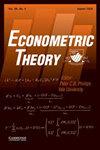TESTING LIMITED OVERLAP
IF 1
4区 经济学
Q3 ECONOMICS
引用次数: 0
Abstract
Extreme propensity scores arise in observational studies when treated and control units have very different characteristics. This is commonly referred to as有限重叠测试
在观察性研究中,当治疗单位和对照单位的特征截然不同时,就会出现极端倾向分数。这通常被称为有限重叠。在本文中,我们提出了一种正式的统计检验方法,有助于评估有限重叠的程度。在我们的检验中,拒绝零假设表明不存在有限重叠或有限重叠程度很轻,因此可以保证标准的治疗效果估计值表现良好。我们测试的一个显著特点是,它只需要使用几个极端倾向得分,这与其他需要对某些尾部指数进行一致估计的方法形成了鲜明对比。由于不需要使用远离尾部的观测数据进行推断,我们的程序有望表现出极佳的规模特性,这一结果也在我们的模拟研究中得到了证实。
本文章由计算机程序翻译,如有差异,请以英文原文为准。
求助全文
约1分钟内获得全文
求助全文
来源期刊

Econometric Theory
MATHEMATICS, INTERDISCIPLINARY APPLICATIONS-STATISTICS & PROBABILITY
CiteScore
1.90
自引率
0.00%
发文量
52
审稿时长
>12 weeks
期刊介绍:
Since its inception, Econometric Theory has aimed to endow econometrics with an innovative journal dedicated to advance theoretical research in econometrics. It provides a centralized professional outlet for original theoretical contributions in all of the major areas of econometrics, and all fields of research in econometric theory fall within the scope of ET. In addition, ET fosters the multidisciplinary features of econometrics that extend beyond economics. Particularly welcome are articles that promote original econometric research in relation to mathematical finance, stochastic processes, statistics, and probability theory, as well as computationally intensive areas of economics such as modern industrial organization and dynamic macroeconomics.
 求助内容:
求助内容: 应助结果提醒方式:
应助结果提醒方式:


